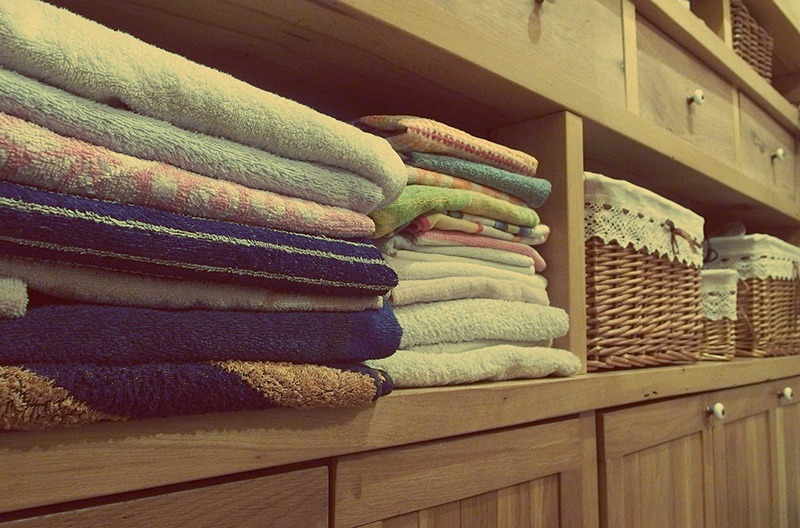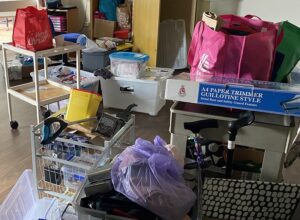
So you’ve finished the decluttering and organising process, and it was laborious. You don’t want to have to go through that again. (at least not to that extent) So… How to Stay Tidy? Now that there is a place for everything, how do you keep everything in its place? How can you prevent chaos from reigning once again?
You could schedule in a daily tidy. Some people swear by the Pomodoro Technique, which entails blocks of 25 minutes of work followed by short breaks. But I don’t do this. I’m all about How to Stay Tidy, not How To Tidy. Personally I believe that if you incorporate the following into your mindset and routine, you don’t have to make a concerted effort to tidy. Here goes…
How to stay tidy – finish up by cleaning up
Unpack as soon as you get home from a day out, a shopping event or a holiday. This includes emptying the car and all bags and putting contents and bags away.
Involve the kids. They don’t get their screen or toys out until their stuff is dealt with. Sounds hard when everyone is tired, but it’s even harder when they are engrossed in Lego, Minecraft or (in my case) a glass of wine. Or the next day when the dumped stuff has subconsciously become an acceptable part of the furniture and nobody is even noticing it any more. Don’t separate the holiday or day out from unpacking your bags – it’s all a part of the same process.
Put laundry away as soon as it’s dry. It’s not an extra job, it’s a part of the chore of washing. Just like food prep and dishes are a part of eating. At the very least, sort and fold right away and place lovingly in your housemates’ rooms. Prompt folding rather than dumping in baskets not only tidies up your space, it also eliminates the need to iron.
Likewise, unpack the dishwasher when it beeps at you. The machine did all the hard work so the least you can do is relieve it of its contents. This prevents the ne’er-do-wells of the house from dumping grubby items amidst the clean.
A task isn’t done until all the supplies are put away where they belong. Finished crafting for the day? Put all the things away. Done with walking the dog? Pop the leash where it goes, not dumped on the doorstep.
Empty the rubbish when it is full so next time you have litter, the bin is on standby ready for duty. A clear bin means no stuff piling up around it.
Deal with each piece of mail as soon as it comes in. Opening the envelopes and sorting it is part of the process of bringing it in. I don’t have a mail pile. It all immediately goes somewhere else. Bills go next to the computer to pay. Torn envelopes go in the recycling bin, etc. If you want to go a step further, try and get everything sent to you online so that mail is a non-issue.
How to stay tidy – general philosophies
I reiterate, ensure everything has a place. Beware of junk drawers! Miscellaneous items with no common purpose are a lot of work to unravel later. Junk drawers are just delayed decisions. Everything you own should have a home that makes sense.
If you have created space in your house by decluttering, don’t feel like you have to fill it. This is just a modern notion sold to us by consumerism, and it leads straight back to clutterdom. Empty space is a beautiful thing. Also, give the items in your cupboard room to breathe, rather than playing Jenga each time you want to retrieve something.
Tidy as you go. Start to notice things that are not in their assigned spot. Don’t move to a different room empty handed. A quick visual scan is generally enough to find if any items are loitering in the wrong place. You are all decluttered and organised and everything has a home therefore it’s a breeze. (right?)
Don’t put it down, put it away. While it’s in your hand, put it where it belongs. This goes back to packing away bags as soon as you walk in. Double-handling is a waste of time and mental energy, and it creates clutter – the very thing we are trying to avoid.
If a task only takes 30 seconds or less, do it right away. Make your bed as soon as you get up. Wipe the bench after lunch. They are small taxes on being a reasonable human.
Don’t leave a room empty handed. There is almost always something to take – rubbish, dirty dishes, a shopping bag, etc.
Stop buying stuff. Steer clear of the shops and online sites, and wean yourself off the quick thrills obtained by purchasing new things. Marketing outsmarts us every time, so it’s best to tune out. Where else can you direct that precious energy? If you can’t bear the idea of not owning an item, just hold off for a while. Give yourself a week and see if you are still thinking about it.
Always have a donation box going. Decluttering is never truly finished, so cultivate a mindset of moving things on when they no longer serve you. When the donation box is full, sell the items online or take it to the op shop.
Have a halfway house for things that need to be returned or belong somewhere else. A friend’s salad bowl, a library book to return, shop exchanges. Get in the habit of checking it every time you leave home. Leaving these things on the bench for weeks just makes them invisible. And they attract more junk. Clutter is like a force field which beckons other items to join it.
Have a one in, one out policy. If you really want that new black jumper, commit to culling one you no longer love.
Do a ‘reset tidy’ before bed. It only takes 10 minutes once you are on top of things, and means you wake up to organised bliss!
Feel free to have overflow storage if you buy things in bulk. Rather than have loo rolls spilling over in the bathroom, put the box in your garage as part of your overflow system. And tell people about it, in case they are inclined to buy more without checking the overflow.
Try implementing these tips and email or print them for each dear member of your house to play along. It’s best to declutter first though. If you are still encountering obstacles at the decluttering stage, get in touch.






























